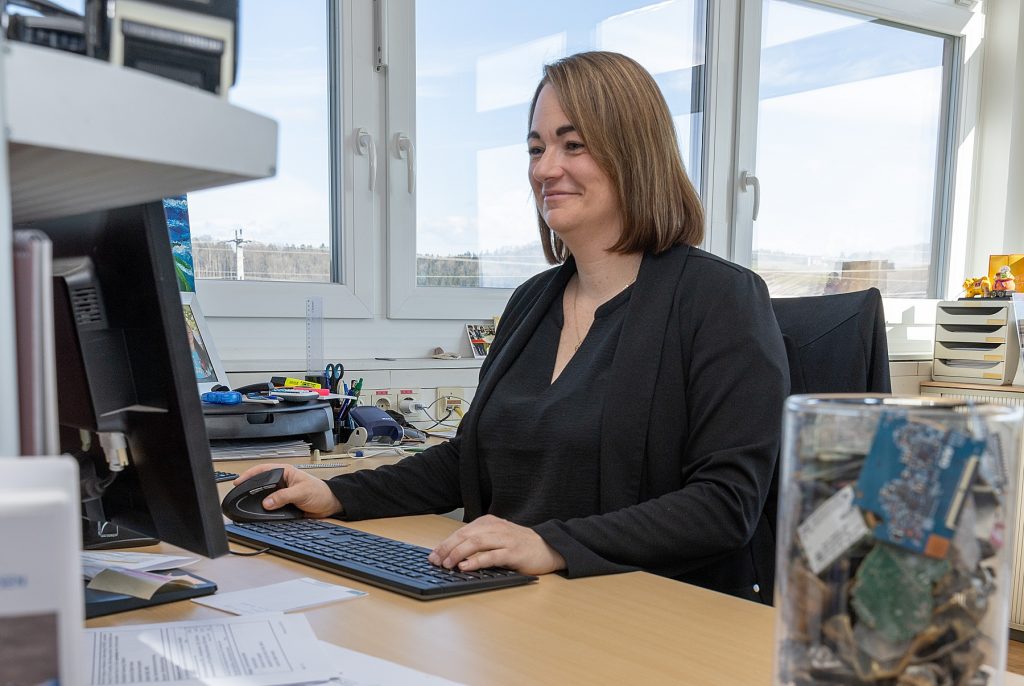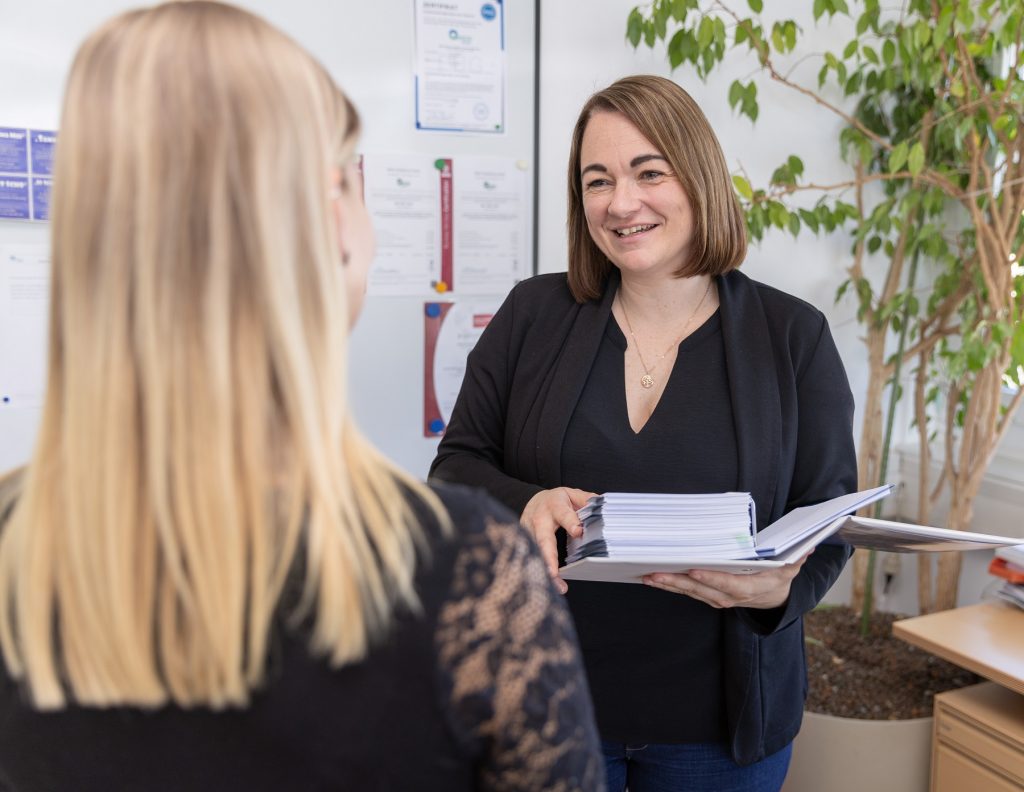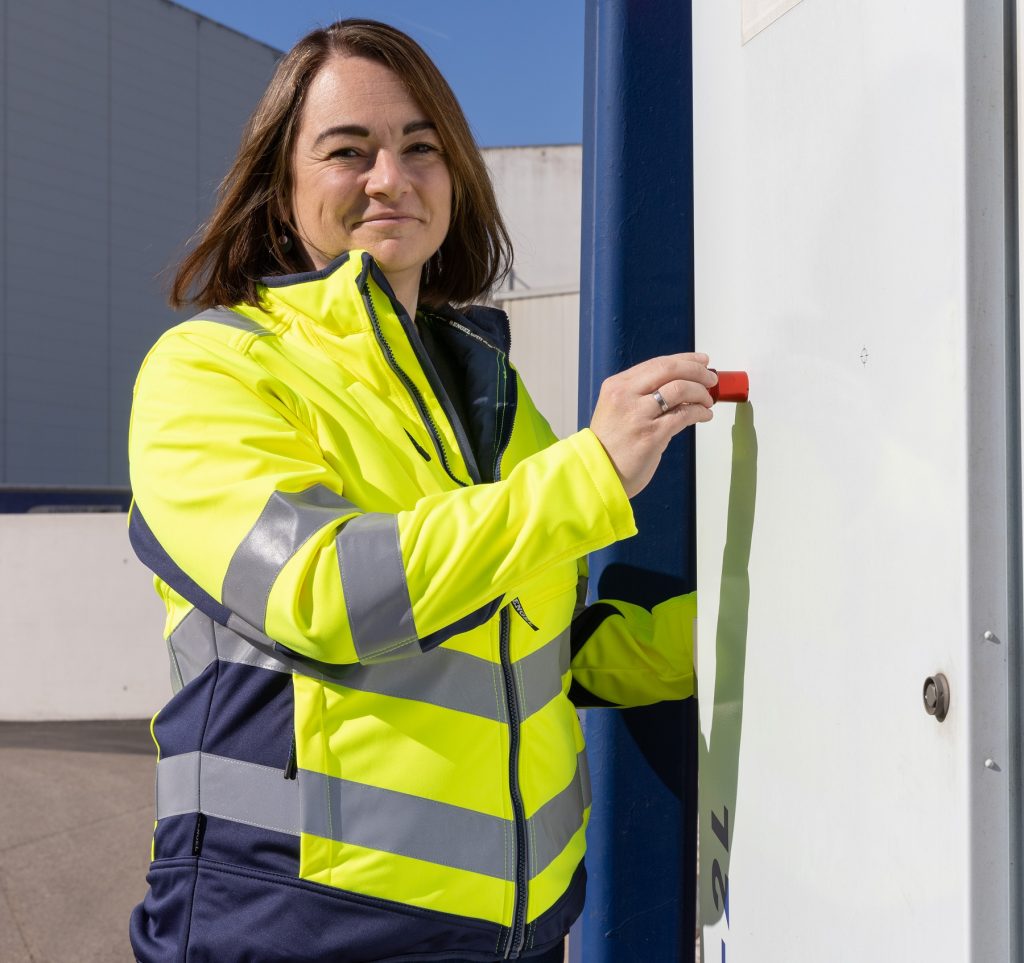When it comes to quality and environmental management at the three Austrian locations of the Müller-Guttenbrunn Group, Lisa Rainer is the lynchpin when it comes to standards, authorities, notifications and legal foundations. We asked the mother of two for an interview.
Mrs. Rainer, how long have you been with Müller-Guttenbrunn? How and why did you join back then?
I have been with the company since May 2003, so this May I will be celebrating 20 years with the company. These 20 years were only interrupted by the births of my two daughters. When I was looking for a job after graduating from the HLW Amstetten, I also came across the Müller-Guttenbrunn company. As a native of Amstetten, I was of course familiar with the company. However, at that time I simply thought: „They do recycling and things like that“. But what exactly goes on behind the walls of the company was more of a mystery to me at the time.

Lisa Rainer from Amstetten is responsible for the areas of environmental and quality management at the Müller-Guttenbrunn Group in Austria.
What are your areas of responsibility?
In the beginning, I was at the registration desk. My field of activity included weighing, reception and telephone administration. Basically everything that belongs to the delivery. As it turned out later, this entry was very helpful for my further career because I was able to gain a good overview of the entire group of companies and its processes. About six years after I joined the company, the position of assistant to the management became vacant because a colleague was pregnant. I applied together with external candidates – and I was more than proud when I got the job. When I became pregnant myself, I said goodbye to my maternity leave with a wistful eye – despite my great joy at this new task. After the birth of our first daughter, I was happy about another pregnancy and a sister for my firstborn. However, it was always clear to me that I did not want to stay at home, but to return to work as soon as possible, which I did in January 2015. I was employed at Metran in the secretariat and soon took over various replacements. During this time I also had to deal with quality and environmental management for the first time. After some time, there was a change in the management and some employees moved to Polymers. I stayed in Amstetten, took over the department I was working in and was responsible for all three plants from then on.
If I may jump back for a moment: What were your initial impressions when you joined the company?
At the beginning, there was the view of the delivery of companies and private individuals, of the logistics processes. The subject of recycling came later, when I started to look at the processes outside my office, especially when I followed Chris Slijkhuis and started to give guided tours to school classes in all three companies. This activity completed my view of the entire group of companies.
And are you satisfied?
Yes. Constantly having to be up to date is an exciting thing. You are constantly challenged to develop further. There is no standing still, that suits me perfectly.
What exactly does „quality and environmental management“ mean? What do your concrete tasks and work look like?
For example, I take care of the applicable compliance guidelines: Have the legal circumstances changed here, is there a need for us to take action? Notifications are also part of my job, as is contact with authorities and ministries in general when it comes to implementing requirements or submitting applications. In order to always be up to date with the latest legal requirements, I regularly attend seminars for further training. ISO certifications are also part of my job. Our quality management is certified according to ISO 9001, our environmental management according to ISO 14001, and I am in charge of the integrated management system and the audits of all three companies. Risks and opportunities must be considered, because every risk also holds an opportunity. It is important to recognise which risks and opportunities we have and which measures result from them. By „integrated management system“ we mean the combination of ISO 9001 and ISO 14001, both – quality and environment – are no longer considered separately, but together in one file. An essential part of daily business also includes ensuring that waste is correctly classified. This is done by assigning key numbers that indicate, for example, whether the waste is hazardous or what the contents of the waste are. This process is carried out in close coordination with the responsible experts in the respective companies. If mistakes were to be made here, illegal shipments could occur and this in turn could even lead to legal action.

Lisa Rainer’s tasks include coordinating with colleagues from different areas as well as communicating with the relevant authorities.
That sounds like a central area of responsibility that is involved in all areas of the company.
Yes, that’s true. I come into contact with pretty much all internal company processes.
What are the special challenges in your work?
It’s a matter of translating very theoretical content, such as ISO certification, into lived practice. That’s a big challenge, but one that I don’t face alone, but work on together with colleagues. My field of activity or job description was not clear from the beginning, it has developed over time. When I started working at Müller-Guttenbrunn after graduating from the HLW, it was in no way foreseeable that I would develop in this direction. For example, I have completed training as a certified quality manager and internal auditor at TÜV-Akademie Austria. I am involved in many internal processes. Notifications in particular can often be very tedious and extend over a long period of time. We have to communicate intensively with the responsible authorities and ministries, and exact deadlines have to be met. It is not unusual to take one or the other tricky matter „home“ in one’s mind. Requests from suppliers are also often a challenge, and the associated clarifications – for example on the subject of feasibility – can be extensive and complicated. What I love about my job is that no two days are the same. Often planned things have to be postponed because of another urgency, which requires great personal flexibility. All this gives me the chance to develop and grow with the tasks.
What does a typical working day look like?
Of course, there are also routines for me, such as ongoing tasks, notifications or updating the management system. But rather to a lesser extent, the focus is on the flexibility I mentioned earlier.
You are responsible for Metrec, Metran and Polymers. What are the differences in quality and environmental management at these three companies of the Müller-Guttenbrunn Group?
The materials we receive at Metrec are basically always the same raw materials, i.e. end-of-life vehicles, which are first de-polluted and then the iron is extracted in the shredder. Or the electronic scrap is also always a relatively similar basic mass. At Metran, on the other hand, every incoming waste must first be analysed and then separated using a wide variety of processes and machines. MGG Polymers is primarily concerned with plastics recycling, and here the major challenges lie above all in the clash between waste management and product legislation.

Regular quality control also includes checking the weighbridge and its radioactivity scanner using a piece of caesium 137.
You also do factory tours for schools, for example. What message is most important to you during these tours? And: What are the most frequently asked questions of the pupils?
Thank goodness the environmental idea is already very strongly anchored in the minds of the younger generation. But it is also enormously important to promote the idea of recycling. We work here with valuable raw materials that are only finitely available on our earth. We have to make sure that copper, for example, ends up in copper smelters and aluminium in aluminium smelters in order to keep these materials in the cycle. We need to raise awareness for the circular economy, which in turn requires consistent and correct waste separation. And this path already begins at home. Discussions with students are always exciting, for example when it comes to the disappearance of end-of-life vehicles to Africa. Students often ask why this circumstance should be viewed negatively, when the vehicles can still be used for a few years by people who urgently need them. What is not taken into consideration here is that the vehicles are ultimately dumped in these countries and not recycled properly, as is the case here. The central message of these tours is always: What can I do for the environment as an individual? Proper disposal supports the environment, supports health, supports our landscape, our homeland.
Let me conclude by asking you a few personal questions. Since „environment“ is in your job definition: How important is sustainability in your private life? And: Is green energy an important part of your everyday life outside of your working hours?
Absolutely. I am proud to be able to work in a company that deals with these issues. This naturally leads to my role in private life: I keep a watchful eye on the correct waste separation of my family. But it is not only the idea of recycling that is important to me and us as a family. We try to live our lives in a sustainable way. Our house has a unit heating system, an air heat pump and recently also a photovoltaic system. For the future, it is most important to be a role model for our children.
And now really the last question: Who is behind the private person Lisa Rainer?
I am 41 years old, live with my family in Amstetten, am married and the proud mother of two daughters (9 and 11 years old). In my private life I am very close to nature, my hobbies are hiking and photography, because they are a perfect balance to my sometimes stressful job. Together with my husband, I am also active in the volunteer fire brigade and we run the Amstettner Hütte on the Forsteralm twice a month on a voluntary basis.
Mrs. Rainer, thank you very much for the comprehensive interview and the exciting insights into your everyday professional life.
